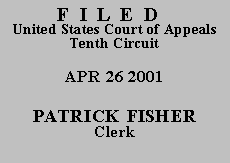

| UNITED STATES OF AMERICA,
v.
ORVILLE DWYER |
|
Before SEYMOUR, McKAY, and
BRORBY, Circuit Judges.
After examining the briefs and appellate record, this panel has determined
unanimously that oral argument would not materially assist the determination of
this appeal. See Fed. R. App. P. 34(a)(2); 10th Cir. R. 34.1(G). The case is
therefore ordered submitted without oral argument.
Appellant Orville Dwyer, a federal inmate appearing pro se, appeals the district court's decision dismissing his motion to vacate, set aside or correct his sentence under 28 U.S.C. § 2255. We deny Mr. Dwyer's request for a certificate of appealability and dismiss his appeal.
Mr. Dwyer pled guilty to conspiracy to possess, with intent to distribute, 100 kilograms or more of marijuana; he did not appeal his five-year sentence. In his § 2255 motion, Mr. Dwyer raised several grounds for review of his conviction and sentence, including allegations of governmental misconduct and ineffective assistance of counsel. Mr. Dwyer based part of his governmental misconduct and ineffective assistance of counsel claims on his assertion that the prosecution and Drug Enforcement Administration agents withheld information identifying one of his co-defendants, Mr. Williams, as a confidential informer.
The district court assigned the matter to a magistrate judge who issued an exhaustive twenty-four page report, consisting of multiple findings of fact, a comprehensive review of the issues presented and applicable law, and a recommendation for dismissal of Mr. Dwyer's § 2255 motion. Specifically, the magistrate judge found nothing in the record to substantiate Mr. Dwyer's conclusory allegation that Mr. Williams acted as a confidential informant or that the government concealed this fact. Instead, the magistrate judge found the presentence report unambiguously characterized Mr. Williams as a target of the investigation and that Mr. Dwyer clearly accepted the factual basis of that report at his sentencing hearing. After a de novo review of the magistrate judge's report and Mr. Dwyer's objections thereto, the district court adopted the magistrate judge's findings and recommended disposition, and dismissed Mr. Dwyer's § 2255 motion with prejudice.
On appeal, Mr. Dwyer raises the same assertion of governmental misconduct and ineffective assistance of counsel based on the government's failure to identify Mr. Williams, known as "Frenchie," as a confidential informer. By not identifying Mr. Williams as a confidential informer, Mr. Dwyer asserts drug enforcement agents provided false statements. In turn, Mr. Dwyer claims his trial counsel acted ineffectively by failing to ascertain that these drug enforcement agents gave false statements or defend Mr. Dwyer's case using this outrageous conduct as a defense. Mr. Dywer reasons that if his counsel had "vigorously pursued the true fact that it was not a real reverse-sting and utilized the fictitious information supplied by agents," the result of his proceeding "would have been different."
"In reviewing the denial of a § 2255 motion, we review the district court's legal rulings de novo and its findings of fact for clear error." United States v. Cockerham, 237 F.3d 1179, 1181 (10th Cir. 2001). In this case, the magistrate judge found nothing in the record to substantiate Mr. Dwyer's self-serving allegation that Mr. Williams acted as a confidential informant or that the government concealed this fact. Our review of the record, including the Drug Enforcement Administration agents' reports, leads us to the same conclusion. While one of the reports identifies Mr. Williams as also being known as "Frenchie," nothing identifies Mr. Williams as a confidential informer. Thus, we cannot say the magistrate judge's finding of fact, and the district court's adoption thereof, is clearly erroneous. Because the factual predicate supporting Mr. Dwyer's allegations of governmental misconduct and ineffective assistance of counsel is unsubstantiated, his legal arguments supporting those allegations likewise lack merit.
In order for this court to grant a certificate of appealability, Mr. Dwyer must make "a substantial showing of the denial of a constitutional right" as required under 28 U.S.C. § 2253(c)(2). He fails to do so. Accordingly, for the reasons stated herein, and for substantially the same reasons provided in the May 4, 2000 Magistrate Judge's Findings and Recommended Disposition, and the district court's June 23, 2000 Order Adopting Magistrate Judge's Findings and Recommended Disposition and Dismissing Action with Prejudice, we deny Mr. Dwyer's request for a certificate of appealability and DISMISS his appeal.
Entered by the Court:
WADE BRORBY
United States Circuit Judge
*. This order and judgment is not binding precedent except under the doctrines of law of the case, res judicata and collateral estoppel. The court generally disfavors the citation of orders and judgments; nevertheless, an order and judgment may be cited under the terms and conditions of 10th Cir. R. 36.3.